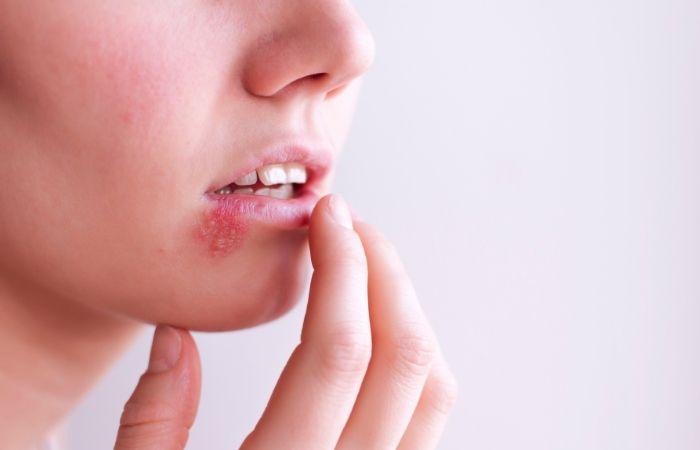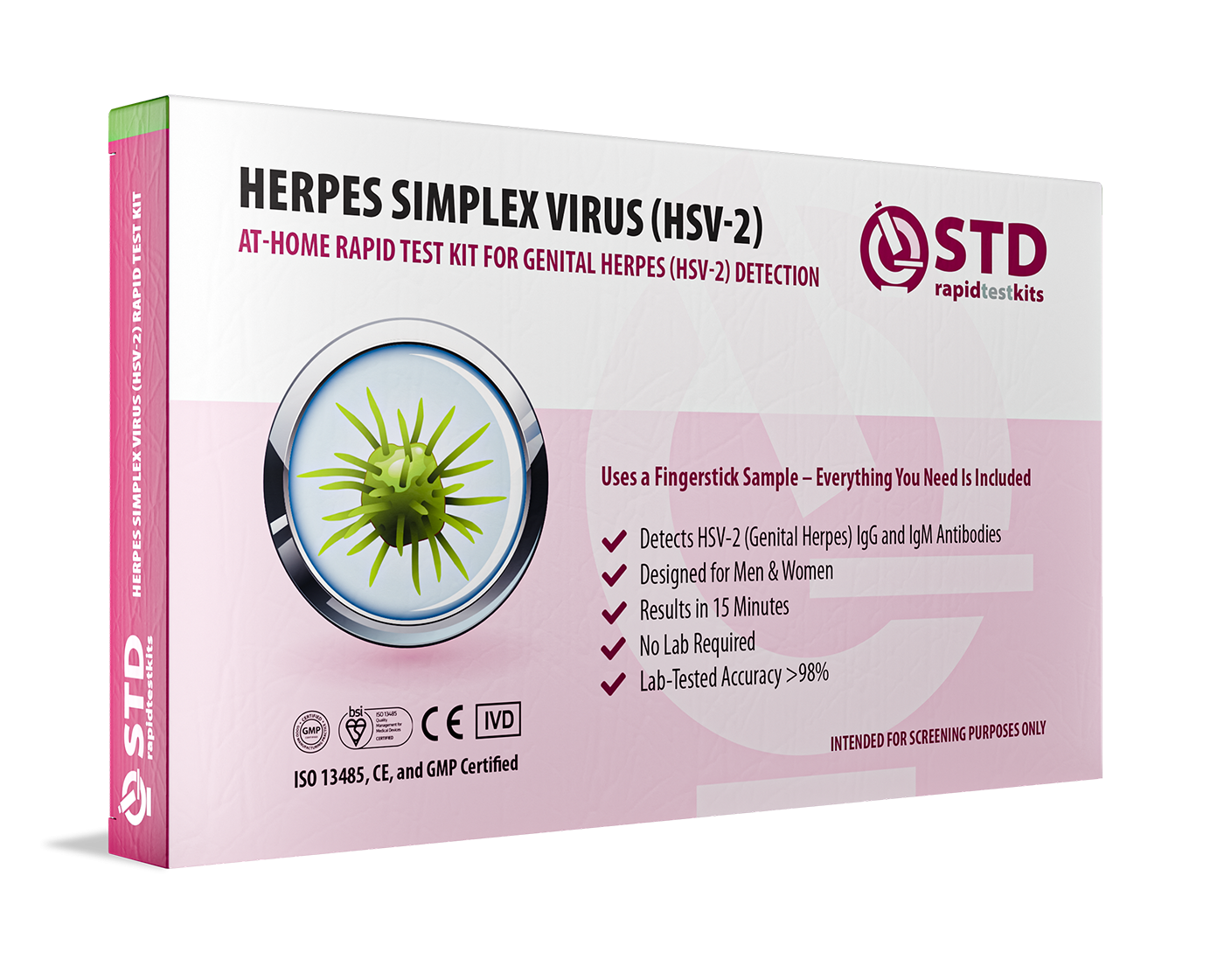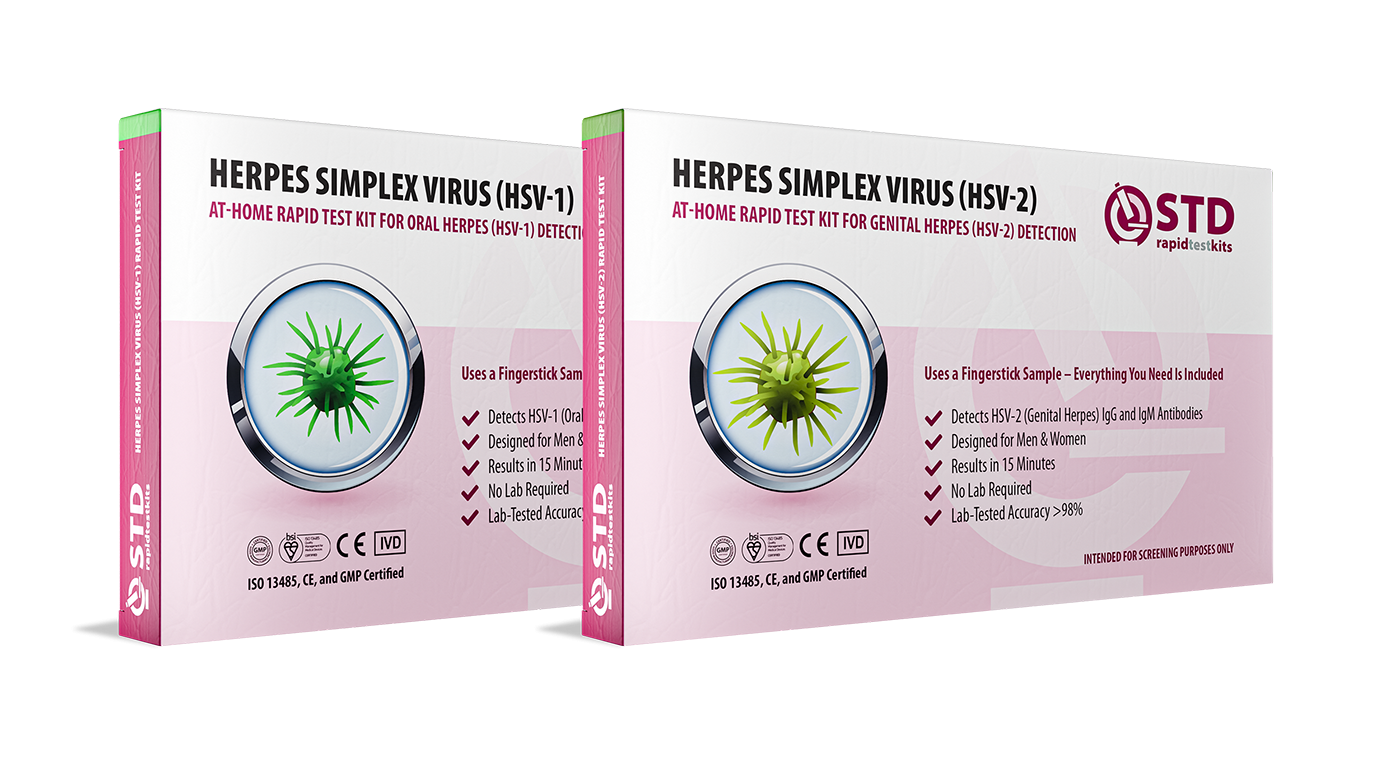STDs Without Sex: Sharing, Skin Contact, and Surprising Risks
Let’s skip the awkward small talk. You just found out you have herpes, and whether it's because of a surprise sore on your lip or an unwelcome genital flare-up, your diagnosis just flipped your world upside down. Your brain is now a chaotic scroll of Google searches. You're trying to figure out how you got it, what to do next, and the one question no one seems to explain clearly: what the hell is the difference between HSV-1 and HSV-2?
Maybe you’ve heard of cold sores. Maybe you’ve been warned about genital herpes in sex ed (if you even got that much). But here you are, staring at a diagnosis and wondering what it really means, for your health, your relationships, and your sex life.
You’re not alone. And this guide? It’s here to clear up the confusion, kill the stigma, and give you answers without the judgment.
Quick Answer
HSV-1 and HSV-2 are two strains of the herpes simplex virus. HSV-1 usually causes oral herpes (cold sores), while HSV-2 is most often behind genital herpes outbreaks. But either type can infect either location. The key differences come down to how they’re transmitted, how often they recur, and how contagious they are when dormant. Understanding which one you have helps you manage it better, reduce risk to partners, and get real about treatment.
What Exactly Is HSV-1?
Let’s start with the one most people know, HSV-1, the virus responsible for those infamous cold sores that show up uninvited on your lip right before a date or family photo. HSV-1 is everywhere. Like, everywhere. By adulthood, the majority of people worldwide carry HSV-1, often without even realizing it.
This strain is primarily transmitted through oral contact, which is why you often hear it referred to as “oral herpes.” Kissing, sharing drinks, or even childhood interactions with infected caregivers can pass it along. Most people are exposed to it when they’re young, long before they even start thinking about sex.
But here’s what’s often left out of the conversation: HSV-1 can also be transmitted to the genitals. All it takes is oral sex from someone with the virus (even if they don’t have visible sores), and boom, you’ve got genital herpes caused by HSV-1.
Once it’s in the body, the virus hangs out in your nerve cells for life, reactivating now and then. In the mouth, it tends to cause occasional cold sores, usually brought on by stress, illness, or sun exposure. In the genitals, HSV-1 tends to cause fewer outbreaks and less frequent viral shedding than HSV-2.
So if you were diagnosed with genital herpes and told it's HSV-1, you're not alone, and yes, it's becoming increasingly common, especially among younger people. Oral sex isn’t “safe sex,” and most people don’t even know they carry the virus. Genital HSV-1 is now a leading cause of first-time genital herpes infections.

What Exactly Is HSV-2?
Now let’s talk about HSV-2, the strain most people think of when they hear the words genital herpes. It’s sexually transmitted almost exclusively through genital-to-genital contact, and it’s less likely to appear on the mouth (though it can happen). This is the strain behind the stereotypes, the stigma, and the whispered conversations after a hookup that ended with “something felt off.”
What makes HSV-2 distinct isn’t just its location, it’s the way it behaves. HSV-2 is more likely to cause recurrent outbreaks. Once it infects the genital area, it tends to stick around like a bad ex: showing up uninvited, especially when your immune system is down, you're under stress, or your hormones are shifting. Some people experience outbreaks every few months; others go years without a flare-up after their initial infection.
But here’s what really sets HSV-2 apart: it sheds virus more frequently, even when there are no visible symptoms. This makes it easier to pass on during sex without even realizing it. That’s why asymptomatic shedding is a big deal with HSV-2, it’s one of the main reasons people can unknowingly infect their partners.
Unlike HSV-1, which people often contract in childhood and carry for decades without it ever being labeled an STD, HSV-2 is almost always linked to sexual contact. That fact alone gives it a heavier social weight, though from a medical perspective, both strains are manageable and neither one is dangerous for your long-term health if you're otherwise healthy.
Still, HSV-2’s tendency to hang around the genitals, trigger regular recurrences, and spread without symptoms means people need to take extra steps if they have it. This includes:
- Open conversations with partners
- Consistent use of condoms or barriers
- Daily antiviral medication if outbreaks are frequent or to reduce transmission risk
And most importantly? Getting tested, because many people with HSV-2 don’t know they have it until they pass it on.
Order Now $45.99 $49.00 Check Your STD Status in Minutes
Test at Home with Remedium
Genital Herpes Test Kit




Same Virus Family, Different Vibes
Both HSV-1 and HSV-2 belong to the herpesvirus family, and both are lifelong infections. Neither is curable. But each behaves differently, depending on:
- Where on your body the virus is living
- Which type of herpes you were infected with
- Your immune system and lifestyle triggers
If you’re feeling overwhelmed, that’s okay. It’s a lot. But the good news is this: herpes is more manageable than people think, and understanding your type, whether it's HSV-1, HSV-2, or both, is the first step toward reclaiming control over your sex life and your mental health.
Testing can tell you not only if you have herpes, but which type. And no, you don’t have to wait for an outbreak. With at-home options like the Herpes Test Kit, you can get answers without ever stepping into a clinic.
How Do You Know Which One You Have?
You might think it’s easy, cold sore equals HSV-1, genital outbreak equals HSV-2. But it’s not that straightforward. Thanks to oral sex, HSV-1 can show up in the genitals, and though rare, HSV-2 can show up on the mouth. So how do you actually know?
Testing is the only way to be sure. If you’re in the middle of a first outbreak, a swab test from a sore can determine not just that it’s herpes, but also which type. If you’re not having symptoms, a blood test (IgG) can detect antibodies and tell you which virus your body has encountered. But blood tests won’t tell you where it’s living in your body. That’s why some people go years thinking they just get cold sores, until they transmit HSV-1 genitally during oral sex and their partner gets a genital herpes diagnosis.
Doctors don’t always include herpes testing in routine STD panels, which means you have to ask. And if you’d rather avoid the clinic altogether, you can opt for a discreet, accurate at-home herpes test that checks for both HSV-1 and HSV-2.

Why Stigma Hits Harder with HSV-2
Let’s be honest: herpes stigma is a social invention, not a medical one. No one freaks out about a cold sore, even though it’s literally oral herpes. But the moment you mention “genital,” the conversation changes. People act like it’s shameful, dangerous, or the mark of promiscuity. It’s none of those things.
The truth? Herpes is a virus. That’s it. It doesn’t define your sexual history, your character, or your future.
The heavier stigma around HSV-2 comes down to a few things:
- It’s sexually transmitted, so it gets lumped in with moral panic around sex.
- It tends to recur more frequently, which makes it feel harder to “forget about.”
- There’s less public education about it, so fear fills the gaps where facts should be.
But here’s what we know from real-world data: more than one in eight people ages 14–49 have HSV-2 in the U.S. alone, and most of them don’t know it. Over 50% of new genital herpes cases are now caused by HSV-1. That means we need a new script, one that focuses on facts, not fear.
What About Relationships and Sex?
One of the hardest parts of any herpes diagnosis, whether HSV-1 or HSV-2, is figuring out how to navigate intimacy. But having herpes doesn't mean you can't have a fulfilling, sexy, connected life.
What it does mean is being proactive:
- Disclose before sex. It’s not just ethical, it builds trust. And surprisingly, many people are open to dating someone with herpes once they understand the facts.
- Use protection. Condoms and dental dams reduce the risk of passing the virus, even when there are no visible symptoms.
- Consider antivirals. Daily suppressive therapy significantly lowers the chance of transmission, especially with HSV-2.
- Know your body’s rhythms. You’ll learn what triggers outbreaks and how to prevent them over time.
Whether you're carrying HSV-1, HSV-2, or both, herpes doesn’t mean you’re off the market. It just means you’re having a grown-up conversation about real risk, and that’s something more people need to be doing anyway.
Order Now $33.99 $49.00 Check Your STD Status in Minutes
Test at Home with Remedium
Oral Herpes Test Kit




The Most Common Misconceptions, Debunked
If you’ve heard that herpes means you’re “dirty,” “promiscuous,” or “irresponsible,” you’ve been lied to, probably by pop culture, sex ed classes that sucked, or someone equally confused. Let’s bust those myths.
Herpes only affects people who sleep around.
Fact: Most people with herpes got it from someone who didn’t know they had it. It can happen in a long-term monogamous relationship. It can happen the first time you have sex. This virus doesn’t care about your relationship history.
You can always tell when someone has herpes.
Fact: Not even close. A huge percentage of people with HSV-1 or HSV-2 are completely asymptomatic. No blisters, no tingling, just viral shedding and unknowingly passing it on.
Condoms prevent all transmission.
Fact: Condoms reduce the risk, but herpes can spread from skin-to-skin contact in areas not covered by a condom. This is why knowing your type and using suppressive medication can be equally important in reducing transmission.
Herpes is the worst STD.
Fact: It’s not even close. Herpes is inconvenient, yes. Emotionally heavy at first, sure. But it doesn’t damage your long-term health, it’s manageable, and millions of people live full, happy lives with it.

FAQs
1. Can you have both HSV-1 and HSV-2 at the same time?
Yes. It’s entirely possible. If you’ve had cold sores since you were a kid, that’s likely HSV-1. If you later contract HSV-2 through sex, you’ve got both. And while it sounds scary, managing both types isn’t drastically harder than managing one, though your doctor might recommend daily antivirals.
2. Can HSV-1 be genital? Can HSV-2 be oral?
Yes to both. HSV-1 can be transmitted to the genitals through oral sex. In fact, it’s now one of the most common causes of genital herpes in people under 30. HSV-2 on the mouth is rare, but it can happen, typically through oral-genital contact.
3. What if I’ve never had symptoms, can I still have herpes?
Absolutely. Many people with HSV-1 or HSV-2 never show symptoms, but they can still pass the virus to others. That’s why testing is important, even if you feel fine.
4. How often will I get outbreaks?
It depends on the type and your immune system. Genital HSV-1 tends to cause fewer and less frequent outbreaks than HSV-2. Some people have one outbreak and never see it again. Others might have a few per year. Suppressive therapy can reduce this significantly.
5. Can I still have sex? Date? Get married?
Yes, yes, and yes. People with herpes date, have amazing sex lives, get married, and even have kids without passing it on. The key is knowledge, communication, and protection, not shame or silence.
6. Will herpes affect my fertility or ability to have a healthy pregnancy?
No, herpes doesn’t affect fertility. But it can pose risks during childbirth if the mother has an active outbreak. That’s why it’s critical to know your status and work with your OB/GYN if you’re planning a pregnancy or already pregnant.
7. Can I give someone herpes even if I don’t have an outbreak?
Yes, and this is one of the most misunderstood parts of herpes. The virus can be spread during periods of asymptomatic shedding, meaning your body is releasing the virus even when there are no sores. This is especially common with HSV-2, and it’s one of the main reasons the virus spreads so easily. Suppressive therapy and condoms reduce this risk but don’t eliminate it completely.
8. Does herpes mean I’ll always be contagious?
Not always, but there will always be some risk. The virus goes dormant and reactivates unpredictably. Most transmission happens when people don’t have symptoms. That’s why learning your type and pattern, and discussing risk honestly with partners, is so important. The more you know, the more you can control.
9. How long after exposure can herpes show up?
It varies. Herpes can show up within a few days of exposure, or it can take weeks, months, even years. Some people carry the virus for ages without any symptoms and don’t realize they’re infected until they pass it on or finally have a flare-up.
10. Should I avoid dating or hookups now that I have herpes?
Absolutely not. Herpes doesn’t take you off the market, it just forces better conversations. Many people are open to dating someone with herpes when it’s approached honestly. And guess what? Tons of them already have it themselves. You just don’t know because, like you, they haven’t talked about it yet.
Order Now $75.00 $98.00 Check Your STD Status in Minutes
Test at Home with Remedium
Genital & Oral Herpes Test Kit




For all 2 tests
Final Word: Take the Power Back
Here’s the thing about HSV-1 and HSV-2, neither one defines you. They’re viruses. They don’t make you dirty. They don’t make you unlovable. And they sure as hell don’t mean your sex life is over.
What they do mean is this: it’s time to get smart, take charge, and live honestly. Herpes isn’t a scarlet letter. It’s an extremely common infection that’s been buried under layers of shame and silence for way too long.
So what should you do now?
- Get tested, especially if you’re not sure which type you have. You can do it privately with a Herpes Home Test Kit.
- Educate yourself, because facts kill fear.
- Talk to your partner, it’s awkward, but it’s powerful.
- Live your life, because herpes doesn’t cancel your worth, your relationships, or your joy.
If you’re still unsure or want a broader screening, a Combo STD Home Test Kit is a solid way to get peace of mind from the comfort of your couch.
This isn’t the end. It’s the beginning of taking your sexual health, and your power, back.
Sources
1. CDC Herpes – Genital Herpes - CDC Fact Sheet – CDC
2. Mayo Clinic – Genital Herpes – Mayo Clinic
3. Epidemiology of HSV-1 and HSV-2 in the United States – National Library of Medicine
4. Clinical Differences Between HSV-1 and HSV-2 Genital Infections – NCBI
5. HSV-1 Genital Infection Rates Are Increasing – Journal of Clinical Virology










